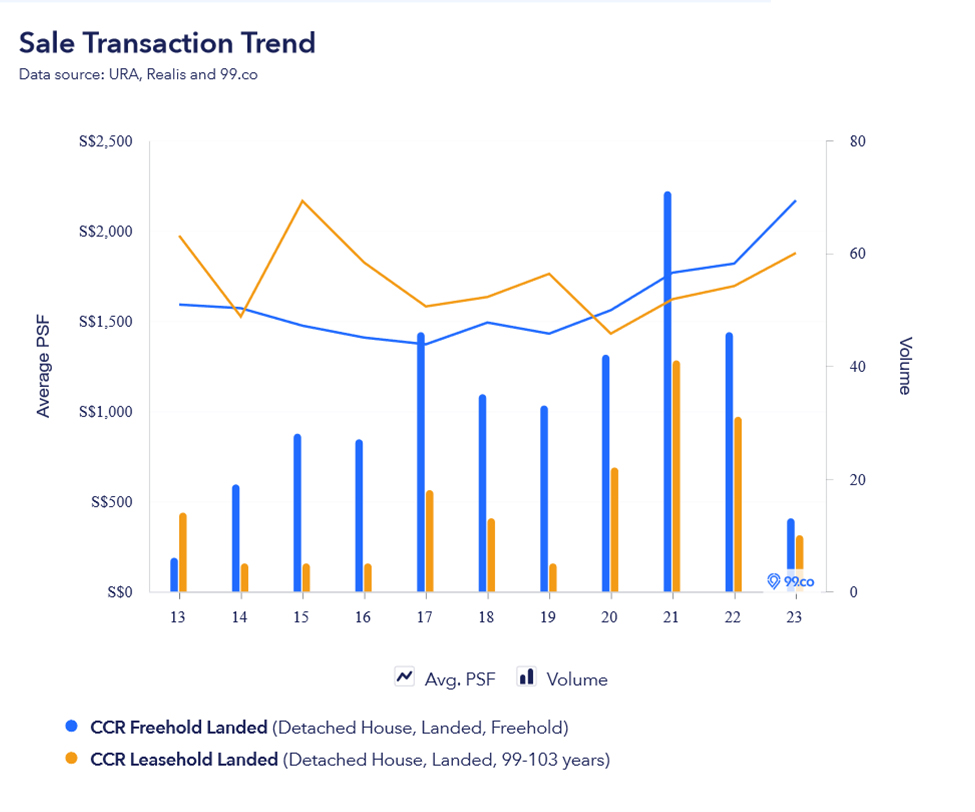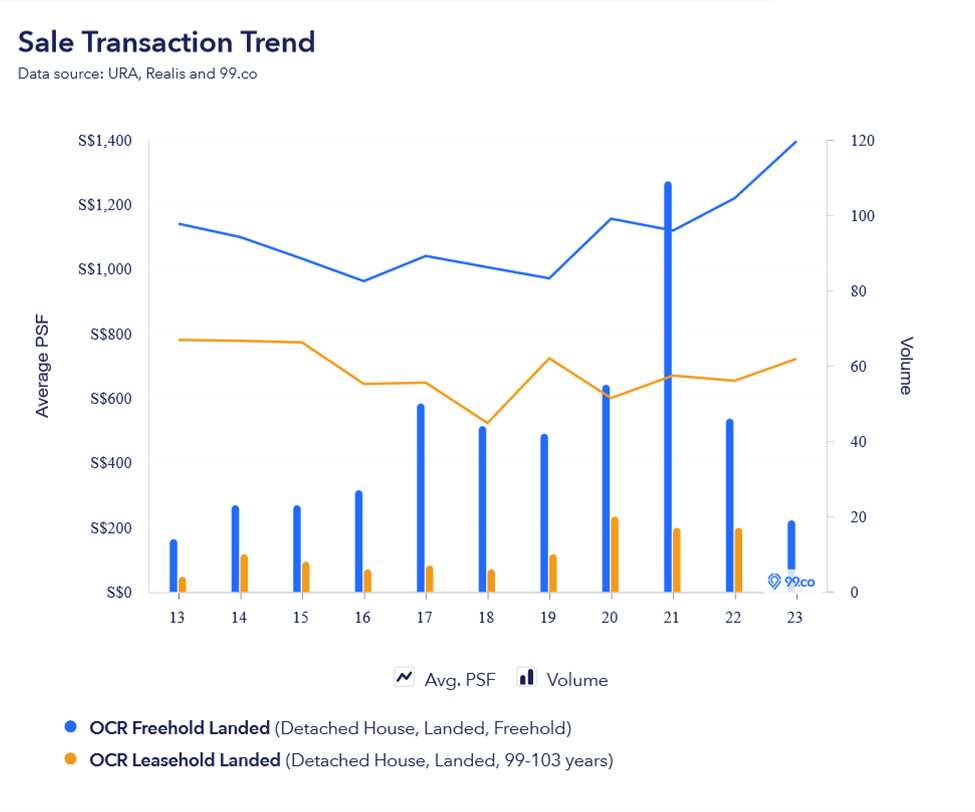You’ve saved up for years, finally reached single-digit millionaire status (or better), and now you can afford a landed home. The issue now is house hunting, and the big question of leasehold versus freehold. Unlike condos, the discrepancy between the two is much more sizeable in the landed segment; and there are some vital issues to know before you make you move:
How well do leasehold landed homes perform, versus freehold?
Let’s take a look at islandwide numbers:

Over the same time period, freehold detached houses have risen in value from $1,261 psf, to $1,703 psf; an increase of around 35.1 per cent.
But looking at this islandwide is a bit too vague, so perhaps we can narrow it down to certain areas.
Let’s look at the most prime districts, in the Core Central Region (CCR). These include districts 1, 2, 6, 9, 10, and 11:

Here, we see leasehold detached homes actually declined in value over the past 10 years. They fell from $1,972 to $1,876 psf, a dip of around 4.9 per cent.
On the other hand, freehold detached homes rose about 36.3 per cent, from $1,590 to $2,168 psf.
Next let’s look at the Rest of Central Region (RCR), which includes districts 3, 4, 5, 7, 8, 12, 13, 14, 15, and 20:

Freehold detached homes saw average prices rise 47 per cent, from $1,113 psf to $1,167 psf.
Frankly though, I would disregard the comparison for the RCR, on account of the scarce number of transactions. There just aren’t very many leasehold detached houses here.
Finally, let’s look at the fringe or Outside of Central Region (OCR), which comprises districts 16, 17, 18, 19, 21, 22, 23, 24, 25, 26, 27, and 28:

Nonetheless, average leasehold detached homed have dipped about 7.5 per cent, from $780 to $722 psf. On the other hand, freehold detached homes saw prices rise 22.4 per cent, from $1,140 to $1,396 psf.
Despite some gaps, we can see a general trend appearing

Not all landed properties (in terms of detached housing) are equal. Leasehold and freehold landed see very different performances; and the market data suggests that – if you have an eye toward resale gains – then freehold may be the way to go.
What are the reasons for this? They mainly come down to the following:
- Sentosa Cove’s performance
- The rarest properties are freehold landed
- Cluster housing issues
- Legacy planning issues
1. Sentosa Cove’s performance
If we look at the performance of landed properties in general, Sentosa Cove falls way behind the islandwide average:

However, the affluent buyers in the Sentosa Cove area are not too concerned about issues like future gains – their homes are for personal comfort. On top of that, Singapore Citizens rarely want to buy leasehold bungalows on Sentosa Cove, when for comparable prices they can get a freehold alternative in a place like Nassim, Tanglin, Orchard, and so forth.
As many leasehold detached homes are on Sentosa Cove, and it’s an area where property appreciation is not a priority, it does pull down the islandwide average for the leasehold segment.
2. The rarest properties are freehold landed
The absolute best properties, such as Good Class Bungalows (GCBs), are all freehold landed homes. This uptick in prices are mostly guaranteed, so long as Singapore remains a successful nation state.
There is no more land to build more such homes, and demand will always outstrip supply. It doesn’t have to be just GCBs either; the same principles apply to areas such as the Siglap / Frankel housing enclave, which is one of the last few places where you can build your dream house on huge land plots.
Conversely, leasehold landed homes may not have the same rarity. Some, for instance, are strata-titled (e.g., a villa within a condo), or are forms of cluster housing. While still rarer than condos and flats, these are still being redeveloped and renewed over time; they’re not as rare or irreplaceable as freehold counterparts.
3. Cluster housing issues
Many leasehold detached homes are cluster bungalows (otherwise, they may be cluster terrace homes or semi-detached homes). These don’t match the parameters of what most affluent buyers prefer.
Cluster homes are still subject to MCST style controls, same as a condo. This means you’re regulated in how you can change the façade, and you still share common facilities (pool, gym, etc.) with other households.
Most affluent buyers, however, prefer having their own plot of land, and the freedom to build or change their house however they prefer. This leads to the continued demand for freehold detached homes, versus cluster (leasehold) counterparts.
4. Legacy planning issues
There’s emotional and psychological resonance in freehold housing. There’s a sense that it’s an intergenerational asset; and some reverence for the possibility that, even generations down the road, your great-grandchildren could be living in the same house; or at least the same plot.
Some might feel this is a bit of a romantic notion; and indeed, many freehold homes are sold before such long time spans. Nonetheless, it is a quality that places freehold landed in much higher demand.
There’s also a sense that, for preserved homes or those with historical value, the government is less likely to one day build a train track or road across the property!
This isn’t to say all leasehold landed options are bad

There are times when leasehold may be a better option. They are, for instance, generally cheaper – and if all you want is a place to live out your twilight years, it could be more feasible than overspending on a freehold home (especially if your children already have their own homes, and don’t need to inherit).
Do speak to a qualified expert when making this decision; a financial planner or wealth manager can help you decide whether any property is a good fit for your portfolio. You can also reach out to us at Single Digit Millionaire for help.










